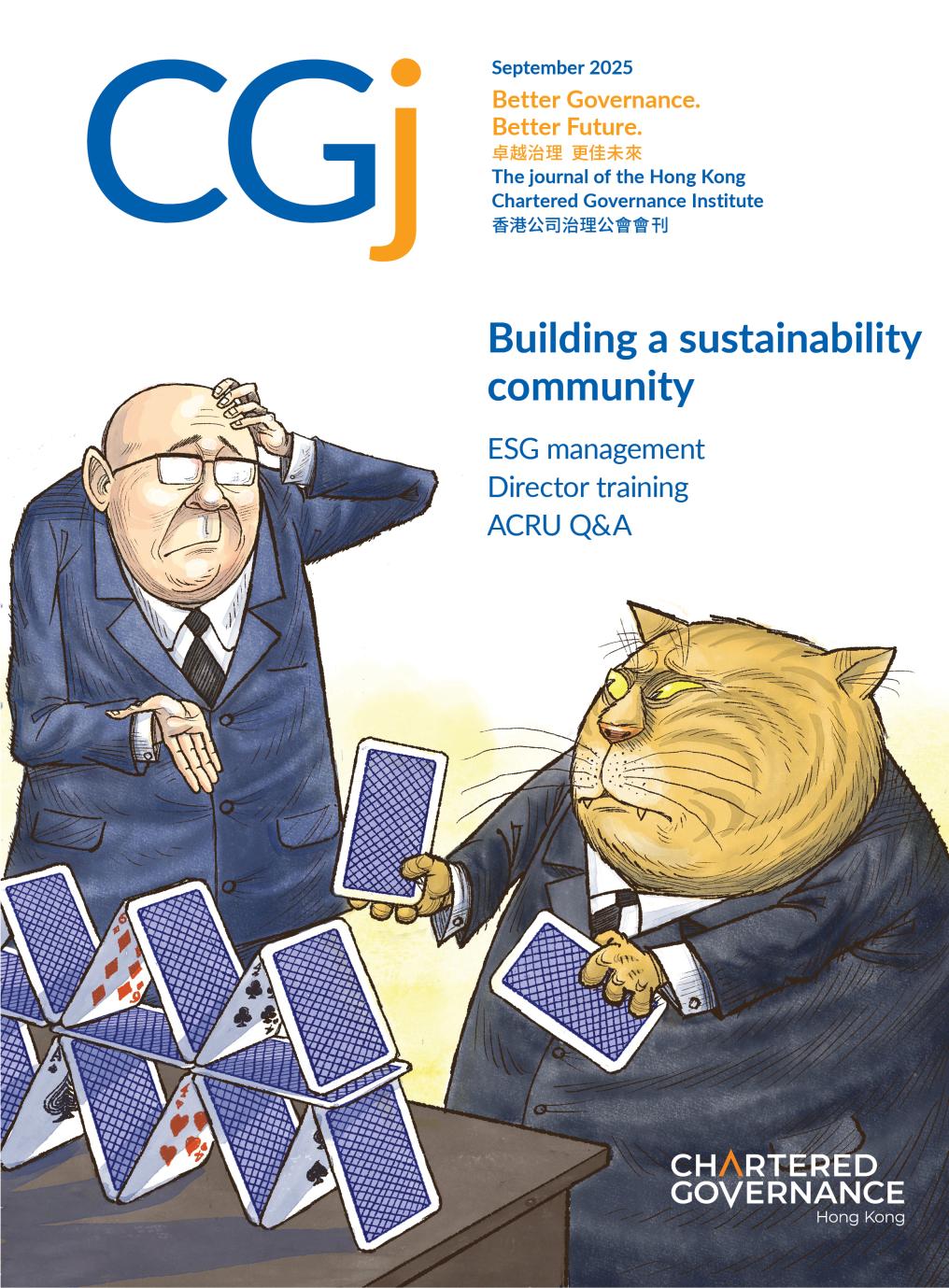In this month’s interview, CGj talks with Professor Susana Yuen ACG HKACG, Dean of Rita Tong Liu School of Business and Hospitality Management, Saint Francis University.
When did you first join the Institute and what was your professional role at that time?
‘I obtained my Associateship more than 30 years ago, at which time the Institute was the Hong Kong branch of The Institute of Chartered Secretaries and Administrators in the UK (now CGI) and had not yet attained local independent status. When I joined, I was teaching at the Hong Kong Polytechnic. I have been actively involved in the Institute’s affairs since 2005, serving as a member of the Academic Advisory Panel, until 2021, and from 2011 to the present day as a member of the Qualifications Committee (formerly the Education Committee). Between 2019 and 2021, I was Chairman of the Qualification Development Panel and contributed to the transition from the International Qualifying Scheme to the current Chartered Governance Qualifying Programme.’
Did membership of the Institute support your career development, and if so, in what ways?
‘Certainly. The Institute offers a wide range of high-quality professional training sessions and seminars, which have been very beneficial to my career development. Even when I’m busy, I’m keen to participate as these events provide excellent opportunities to share experiences and acquire new knowledge. As a member, I am happy to support the Institute’s growth and to stay updated with the latest developments, which helps me maintain my professional edge.’
How has the changing governance landscape affected your role as a teacher?
‘The focus of the curriculum has clearly shifted towards ESG, as this is now a topic of primary concern across industries, including company secretaryship, corporate governance, accounting and investment advisory services. Additionally, the application of AI technology has transformed our teaching content. Our courses now train students to use AI to analyse massive amounts of data and to support decision-making. While AI can assist in analysis, ultimately it is humans who must determine the key factors. Therefore, students are encouraged to maintain an open mindset and to apply new tools with flexibility to keep pace with the rapidly evolving governance landscape.’
Given the different learning needs and expectations of students today, can you share your thoughts on how the Institute’s qualifying programme could be updated and modernised?
‘I have noticed that many students face significant learning pressures, especially working professionals who must balance self-study with demanding jobs. Time management is their greatest challenge. Many feel discouraged by the difficulty of the examinations, with some even giving up halfway, which is detrimental to talent development. The Institute could further enhance knowledge sharing and interactive learning to help students better understand and apply their studies. I also believe the curriculum should be simplified and made more relevant to the profession in the local context, and could incorporate more case study discussions and practical guidance to boost students’ confidence when taking the exams. Looking ahead, the Institute might consider partnering with a broader range of education institutions to provide more support and guidance, alleviating students’ burdens and improving learning outcomes. Modernised courses should combine flexible learning methods, practical training and lifelong education to meet diverse needs and to cultivate more outstanding governance professionals.’
Have you noticed any gender disparity in education or the governance profession as a whole?
‘My observation is that even in professional education – for example, students pursuing a master’s in corporate governance – women often outnumber men. This does not necessarily mean that women hold the majority of top management positions, of course, but I have indeed seen many female graduates progress and even take on significant governance roles. In today’s society, career development prospects should not be viewed through the lens of gender. Within the Institute, I have also noticed that many core programmes and projects are led by women, and their status and contributions in the governance field are very prominent. Of course, women may face certain challenges along the way, but at the education and training level, I have not sensed any overt gender discrimination. I am also actively involved in promoting related initiatives to support gender equality and to ensure fair development opportunities for all, regardless of gender.’
What advice would you give to the younger generation starting out on their governance careers?
‘The current economic environment certainly poses significant challenges and some individuals may struggle to secure employment even after obtaining professional qualifications. Therefore, it is all the more important to continue learning and enhancing your competitiveness. Beyond your core expertise, exploring other fields can help broaden your perspective. Moreover, communication skills are crucial. Whether presenting opinions to the board or engaging with investors and stakeholders, strategic and effective communication is essential. The key message I want to share with young professionals is to maintain a lifelong learning mindset. Regardless of your career stage, ongoing professional development – through short courses or workshops, for example – is one of the best investments for your future.’
whether presenting opinions to the board or engaging with investors and stakeholders, strategic and effective communication is essential
Professor Susana Yuen ACG HKACG
Dean of Rita Tong Liu School of Business and Hospitality Management, Saint Francis University
CGj 访问了圣方济各大学廖汤慧霭商业及款待管理学院院长袁丽薇教授 ACG HKACG。
您是什么时候加入公会的?当时您的专业身份是什么?
‘我在30多年前取得会士资格,当时公会是英国特许秘书及行政人员公会(现特许公司治理公会)的分支,尚未获得本地独立地位。我加入时在香港理工学院任教。自2005年起,我积极参与公会事务,曾任学术顾问委员会成员至2021年,并由2011年开始出任专业资格委员会(前身为教育委员会)成员至今。在2019至2021年间,我参与资格发展小组,並帮助公会由国际专业知识评审考试体系转型为特许公司治理专业资格课程。’
公会的会员资格是否有助于您的职业发展?如果有,在哪些方面?
‘当然有,公会为我们提供很多专业培训和研讨会,这些活动质量很高,对职业发展非常有帮助。即使工作忙碌, 我也积极参加,因为这是分享经验和学习新知的好机会。 作为会员,我很乐意支持公会的发展,了解最新动态,这对我保持专业优势很有帮助。’
随着治理环境的变化,这对您作为教师的角色有何影响?
‘现在课程的重点很明显转向ESG,在公司秘书、公司治理、会计、投资顾问等行业,ESG都是首要关注的重要议题。另外,AI技术的应用也改变了教学内容。我们的课程就教导学生如何利用AI分析大量数据和做决策。虽然AI能帮助分析,但最后还是需要人来设定关键因素,因此学生应该抱持开放心态,灵活运用新工具,以应对快速变化的治理环境。’
当今学生有不同的学习需求和期望,您认为公会专业资格课程可如何更新和现代化?
‘我注意到很多学生面临着巨大的学习压力,尤其是在职人士,他们必须在自学和繁重的工作之间取得平衡。时间管理是他们面临的最大挑战。许多人因考试难度过高而灰心丧气,甚至半途而废,这不利于人才发展。公会可以进一步加强知识分享和互动学习,帮助学生更好地理解和运用所学知识。 我也认为课程设置应该简化,使其与本地情况更加相关,并加入更多案例研究和实践指导,以增强学生的应试信心。展望未来,公会可以考虑与更广泛的教育机构合作,提供更多支持和指导,减轻学生的负担,提升学习成果。现代化的课程应该结合灵活的学习方式、实用培训和终身教育,以满足多样化的需求,培养更多优秀的治理专业人才。’
您是否注意到教育或治理职业方面存在性别差异?
‘我的观察是,即使在专业教育方面,比如攻读公司治理硕士的学生,女性人数往往多于男性。这不代表女性在最高管理层的位置上一定占多数,但我确实见到很多女学生毕业后能够晋升,甚至担任重要治理职位。现今社会,我们不应该从性别的角度看职业发展机会。我在公会里也注意到,很多核心计划和项目都是由女性主导,女性在治理领域的地位和贡献都非常显着。当然,过程中女性可能会遇到一些挑战,但在教育和培训层面,我并未感受到明显的性别歧视。我也积极参与相关项目推动,支持性别平等,确保不论男女都有公平的发展机会。’
您对刚刚开始治理生涯的年轻一代有什么建议?
‘当前的经济环境确实带来不少挑战,有些人即使取得专业资格,也未必能顺利就业。正因如此,更要不断学习、 提升竞争力。除了本身的专业知识外,也可以涉猎其他领域,有助于拓阔视野。此外,沟通技巧也是非常重要的一 环。无论是向董事会表达意见,还是与投资者及持份者沟通,都需要有策略、有效的表达能力。我想给年轻人最核心的一句话就是:保持终身学习的心态。无论你在哪个阶段,持续进修,例如参加短期课程或工作坊,都是投资未来最好的方式。’
无论是向董事会表达意见,还是与投资者及持份者沟通,都需要有策略、有效的表达能力。
袁丽薇教授 ACG HKACG
廖汤慧霭商业及款待管理学院院长, 圣方济各大学



